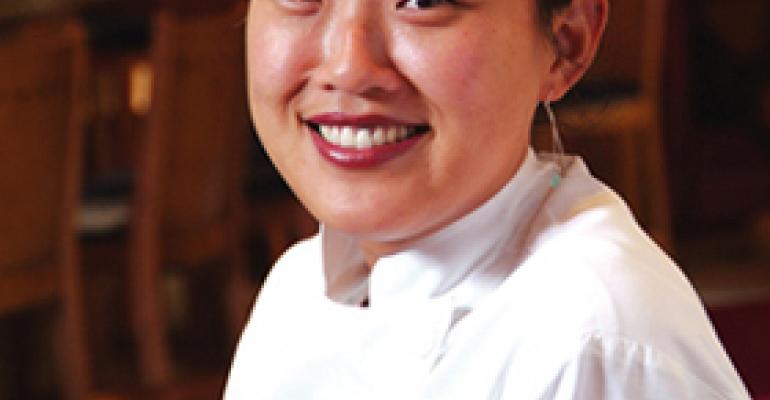Michelle Mah was a sous chef at the Grand Cafe two and half years ago when she was asked to consider the head chef’s position at Ponzu, another Kimpton Hotel & Restaurants property located around the corner in San Francisco’s theater district. Born in Korea and raised in California, Mah may have been a natural choice to run the kitchen at Ponzu, where the menu’s contemporary Asian cuisine is based on Californian products. Mah, however, said she did a lot of studying and research before she could make Ponzu’s menu her own. Her preparation appears to have paid off as Ponzu has earned positive reviews, and Mah last year was named a Rising Star Chef by the San Francisco Chronicle.
BIOGRAPHY Title: executive chef, Ponzu, San Francisco Birth date: April 14, 1975 Hometown: San Dimas, Calif. Education: bachelor’s degree in ethnic studies, University of California, San Diego; associate’s degree from the California Culinary Academy Career highlights: named 2006 Rising Star Chef by San Francisco Chronicle magazine; was sous chef at Grand Cafe in San Francisco; worked at Moose’s and Jianna in San Francisco and Café Japengo in San Diego
What was it like to take over the kitchen at Ponzu?
I was totally overwhelmed. I had a long talk with [Paul Arenstam] the executive chef at the Grand Café at that time. Should I do it? Am I ready? I don’t know if I can do it. I think everyone goes through that when taking the next step up. He was very supportive of me and my ability and he told me, if I have any questions, he’s right next door. Don’t be scared. And the home office was very supportive. They are willing to give you what you need to make it.
How long was it before you felt you were fully in command at Ponzu?
It took a few months before I would let them put my name on the menu. I did not want to take credit for anything that was not mine. When the entire menu had changed over to what I wanted it to be—then I allowed my name on it. I did not want to be responsible for someone else’s recipes. After I had done my first menu that was completely mine, then I was able to relax more. From that point forward, I was inspired to develop my vision for the restaurant.
What is your vision?
I’m trying to be true to the traditional nature of each country but using California products and reinterpreting the cuisine. It’s not about mixing and matching cultures. I want to keep it singular. If Japanese-based, it’s Japanese. If from Malaysia, it’s Malaysian. I do not want to mix it so much. It gets confusing.
I like to call it contemporary Asian. It’s true to the country of origin or culture it is from, but the contemporary part is the California ingredients.
Have you added Korean food to the menu?
People really enjoy the barbecue part of it, [but] Korean cuisine is hard to reinterpret into a more fine-dining cuisine. It is meant to be offered family-style, to be enjoyed around the table. It’s meant to be shared. I now have kimchi fried rice, which is popular, and a spicy Korean pork chop and Korean pancakes.
What are Korean pancakes?
Ground mung beans with carrot and onion. Mung beans are like soy beans. They are ground, pan-fried, sometimes I add a little bit of pork belly in there.
CHEF’S TIPS Roasting vegetables brings out the most flavors; and when you roast squash you don’t have to peel them. When cooking soup, don’t just judge by how thick or thin it is, but by whether it has a nice round, balanced taste. Cooking is based on feeling. Pay attention to all the components.
What are your favorite dishes?
They are all my favorites. They are all my little children.
What do the customers like the most?
They come back for the tartare. Supposedly it’s the best in the city. I don’t know whether that is true or not, but it’s ordered all the time. And the short ribs, although I do not have them on the menu now. Customers enjoy that one. It was inspired by my mom’s recipes.
Did you learn to cook from your mom?
My mom and grandmother were great cooks. My dad would do some Korean dishes when he cooked now and then. I always enjoyed watching the process of cooking. I was always involved in making the Korean pancakes. I developed an appreciation for food. I’d like to try different flavors. My dad let my sister and me cook. We ate Korean food every night.
How did your parents handle the news that you wanted to be a chef?
My parents were a little hesitant about it. No one in our family or group of friends had gone into that field. Being immigrants, what they want for their children is for them to be successful—to become lawyers and doctors and make money to be comfortable. It just didn’t register for them.
Then my mom started looking at food magazines and hearing about chefs on TV. Chefs have like a B-list celebrity status. It’s superficial, but my mom—it’s such a mom thing to say—said ‘You could become a celebrity chef.’
So she must have been thrilled when you were named a rising star by the local media?
Oh yeah.




